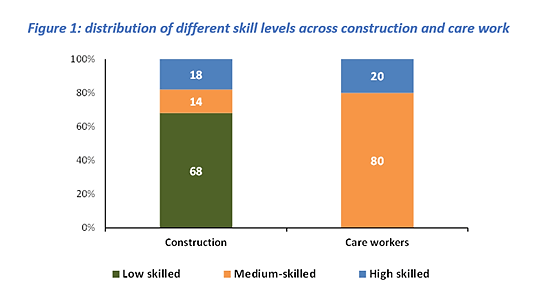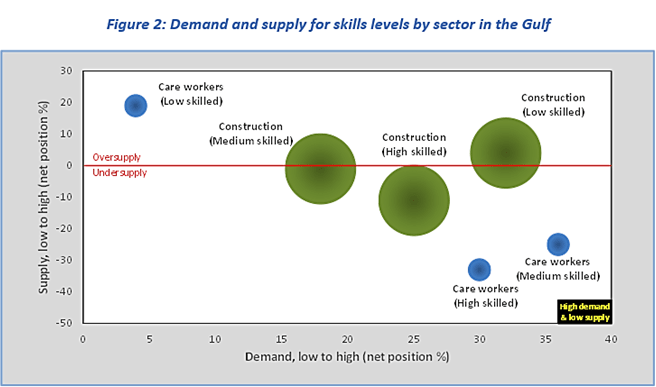Photo credit: Unsplash / Florian Wehde
Changing labour market skill requirements has become a significant focus area for vocational education Ministries and government organisations. In the context of labour migration, understanding market trends and opportunities in receiving migration countries is fundamental to policy formulation and investment in education. On behalf of the ILO, Rapid Asia carried out a labour market assessment in Ethiopia and the Gulf (2021) to better understand skills profiles, deficiencies and opportunities for Ethiopian migrant workers. Ethiopia is a major migrant-sending country to the Middle East, particularly Saudi Arabia, Kuwait and the UAE.
The Gulf Cooperation Council (GCC) countries – UAE, Saudi Arabia, Kuwait, Qatar, Bahrain and Oman – are major migrant worker destinations receiving low, medium and high-skilled workers. Migrant workers comprise most of the workforce, ranging from 56 – 93 per cent, depending on the country. There has been a steady demand for migrant workers in these countries in several sectors, including construction, domestic and care work, hospitality and agriculture. Shifting market trends throughout the Middle East impact labour market demand and supply. For example, investments in new technologies and demographic changes are reshaping skill requirements across sectors. For sending countries dependent on labour migration, understanding labour demand and skills requirements of employers in receiving countries are essential for effective policy formulation and interventions.
In the GCC countries, significant potential for future employment is predicted for the construction and care work sectors. However, there are distinct trends in demand and supply of skill level requirements between these two sectors. Figure 1 below illustrates the stark difference in skill levels across the two sectors based on interviews with employers. While construction still commands large pools of low skilled workers, care workers are predominantly medium and high skilled workers.

Figure 2 below illustrates future demand and supply for skills levels across the two sectors in the Gulf. While there is demand for workers across all skill levels, there is an undersupply of highly skilled workers for construction and care work. There is also undersupply of medium-skilled workers in care work and shows the care work sector has significant supply and demand deficiencies.
Migrant domestic workers are a significant group, estimated at 39% of all migrant workers in the GCC. The study found that employers are gravitating away from low-skilled domestic workers to demanding higher skilled care workers. As illustrated in Figure 1, most employers (80 per cent) in this sector hire medium-skilled, and 20 per cent employ high-skilled workers. Demographic shifts such as the ageing population, lower fertility rates, and more women entering the workforce have increased the demand for care workers with higher skill profiles in the Middle East. The nature of the work itself has shifted from general housework towards caring for the elderly, disabled persons and children. According to the study, care workers require more specialised training and a higher level of core skills such as language skills, basic medical skills, cooking, and following written instruction.

There is an evident shift taking place from low-skilled to medium- and high-skilled workers. The impact of the changing skills landscape opens up new opportunities such as the care work sector, with a growing demand for high-skilled workers while shifting away from the traditional low-skilled domestic workers. For governments looking to support labour migration towards the Gulf, investments in vocational training to upskill their workforce to at least medium-skilled level workers will be essential to facilitate access to sustainable employment for their population.
If you found this article useful, please remember to ‘Like’ and share on social media, and hit the ‘Follow’ button never to miss an article. You may also want to read this article: One way to reduce forced labour.
About the authors: Daniel Lindgren is the Founder of Rapid Asia Co., Ltd. a management consultancy firm based in Bangkok that specialises in evaluations for programs, projects, social marketing campaigns and other social development initiatives. Nadine Spalburg is an independent consultant working with Rapid Asia as a member of their expert panel of consultants.

